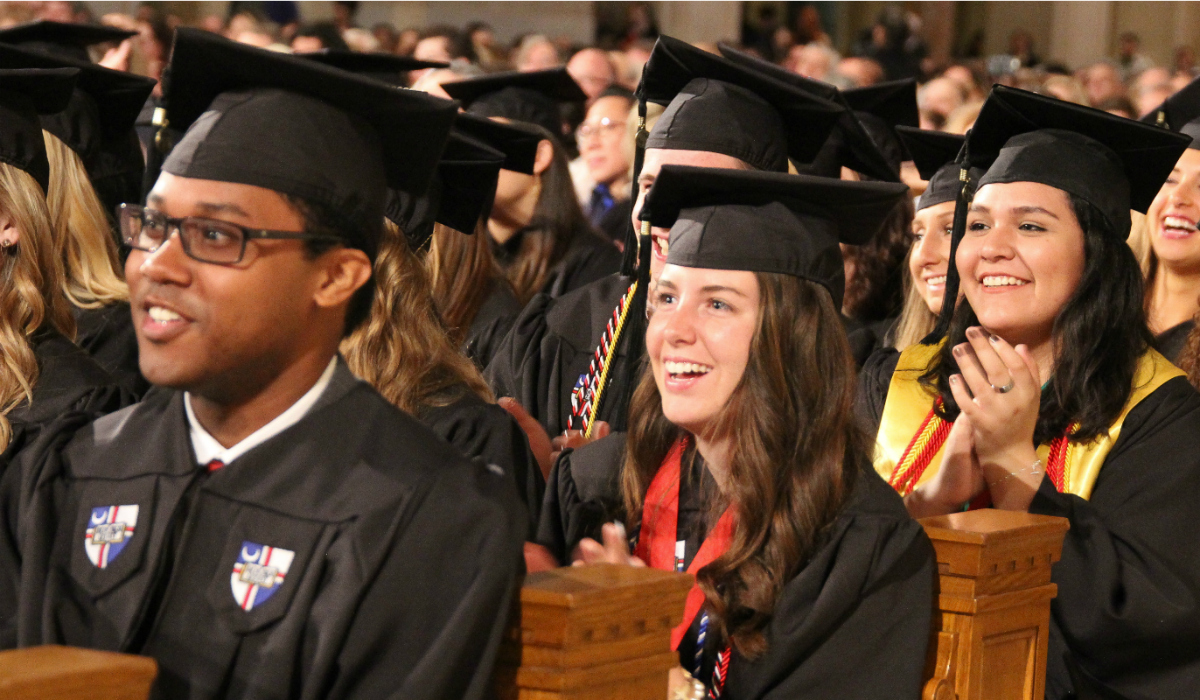

Though their years of academic pursuits may now be complete, The Catholic University of America Class of 2017 received one last piece of wisdom during this year’s Commencement ceremony, which took place, due to inclement weather, inside the Great Upper Church of the Basilica of the National Shrine of the Immaculate Conception.
That advice came from Commencement speaker Peggy Noonan, the Pulitzer Prize-winning Wall Street Journal columnist, author, and former special assistant and speechwriter for President Ronald Reagan. "You must not stop reading books,” she said, during her address to the new graduates of the School of Arts and Sciences. “If you seek a happy and interesting life, one of meaning and accomplishment, you must not stop reading books.”
Speaking from the altar before a crowd of thousands of Catholic University graduates and their families, Noonan said she has been troubled to learn in her recent reporting travels, that many journalists and politicians younger than her have “received most of what they know about history through screens.”
"They have seen the movie and not read the book,” she said. “They’ve heard the sound bite but not read the speech … Their understanding of history, even recent history is therefore superficial.”
Noonan, who has written nine books on American politics, history, and culture, believes that the written word has an advantage in telling history over movies because “books demand and reward.”
Noonan said that reading books, in addition to helping people learn about history, can lead to more wisdom and an ability to think deeply and lead well.“
“It will change how your very mind works. And in some magical way the deep thoughts of others give a spark to, and almost give permission to, thoughts of your own that had been lurking about but never had the courage to present themselves.”
Noonan knows much of this from personal experience. She said books helped her think about and determine her own political leanings, her dreams of being a writer, and even her religious identity as a Catholic. Without reading books, she said she could never have succeeded as a presidential speechwriter or a journalist.
Reading is also how she copes with political and social unease, she said. Lately, Noonan said she’s been reading the biographies of writers like Walter Lippmann and Dorothy Thompson, who lived through difficult periods in history.
“How did they withstand the pressure of sharing their thoughts in public, how did they handle being wrong, what part of their brain did they use to understand or misunderstand Hitler, communism, or the beginnings of the Cold War,” Noonan said. “I reach back to the daily drama of those deeply involved and trying to lead in this great disputatious nation. Everything I write now will be helped by those books.”
The University intended to hold the ceremony on the lawn facing the Basilica, as is the tradition, but it decided to move the event inside on Friday because of predicted rain. Noonan addressed the new graduates of the School of Arts and Sciences during the ceremony. Graduates of other schools and their families could watch the event through a broadcast on campus and on the University website.
Though the reason for the change in plans was unfortunate, Noonan called the day a “wonderful gift” and said she was pleased to speak in the Basilica, a space with such “spiritual splendor and architectural beauty.”
University President Garvey spoke along similar themes during his remarks, encouraging new graduates to continually pursue the virtue of studiousness.
“It’s not just a virtue for students, it will serve you well as you begin the next chapter of your lives,” he said. “Now you will have new responsibilities: deadlines for work, phone calls to return, meetings to attend. These things are important. But they leave little time for reflection, contemplation, or sustained attention to any object or thought.”
Garvey said studiousness can allow new graduates to “know so we can devote our attention to the right things in the right way” rather than giving into a constant barrage of information.
“It is easy to forget that there is a difference between information and knowledge, and that the difference consists in thinking about the information we have,” he said.
Studiousness can also prepare new graduates for a deeper spiritual life. By strengthening their abilities to focus and think deeply, graduates can be better prepared to see God’s presence in their lives.
“Studiousness is the virtue of attention,” Garvey said. “It disposes us to want the truth, to seek it ardently, but also to wait attentively on it. When you practice studiousness in your daily life — when you read a book, look at a painting, talk to a friend — it prepares you to give your full attention to God.”
The University conferred bachelor’s, master’s, and doctoral degrees during the ceremony. The Columbus School of Law commencement ceremony will take place on Friday, May 26, at 11 a.m. in the Great Upper Church of the Basilica.
This year’s law school commencement speaker is Ambassador Charlene Barshefsky, senior international partner at WilmerHale and a 1975 alumna of the Columbus School of Law.
Other graduation events held over commencement weekend included the Honors Convocation and a Baccalaureate Mass, both held on May 12 at the Basilica.